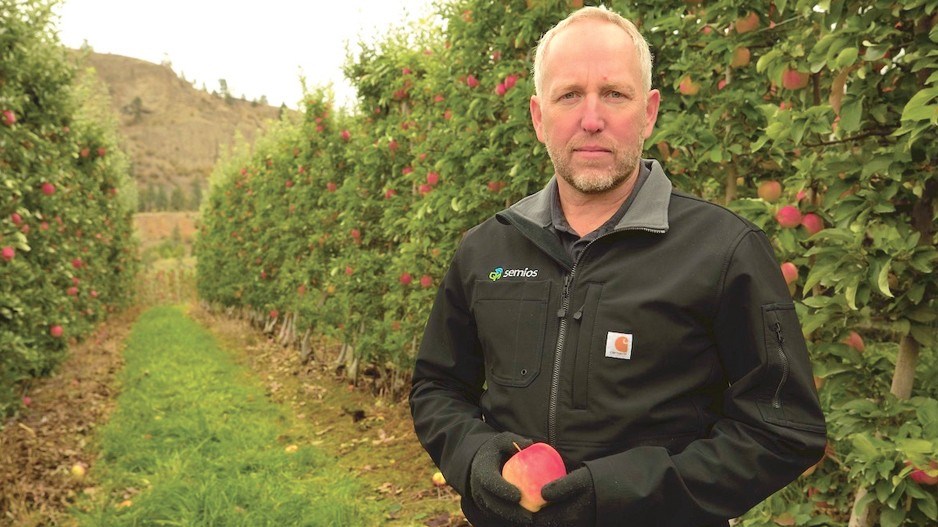As heat domes, hurricanes and wildfires tear across North America this summer, the days of the Farmers’ Almanac offering some sort of predictability to the agricultural sector are long over, according to Michael Gilbert.
SemiosBio Technologies Inc., Gilbert’s Vancouver-based agricultural technology (agtech) firm, specializes in using sensors and data to ensure healthy crops for farmers by monitoring for pests and harmful weather.
“We can’t control [extreme weather events], but we can definitely do a lot to predict what the impact will be,” said Gilbert, the company’s founder and CEO.
About two million Semios sensors are deployed globally, reporting every 10 minutes to help manage farming operations. For example, its devices can detect and identify agricultural pests and trigger the release of pheromones to thwart their mating.
Gilbert said demand for technology that closely monitors and collects data on land is ramping up as climate change wreaks havoc on the environment.
“Just because you can’t grow whatever you’re growing for the last 20 years on that field, doesn’t mean there’s nothing you can grow. There’s probably a different crop that does well when it’s a bit warmer or drier,” Gilbert said. “We can help our customers better understand what would do well or better in those certain areas.”
Semios has been on an acquisition spree over the past three months, scooping up three smaller competitors based in California, Washington state and Australia.
Terms of all three recent acquisitions were not disclosed, but they come as Semios has locked down more than $100 million in growth capital – a mix of equity investments and debt facilities – over the past 18 months.
Gilbert said he targeted these companies based on customers’ desire to lock down a wide range of services under a single offering.
“When you’re farming a large operation, logistics is everything.”
Gilbert added that the recent acquisitions will boost the predictive capabilities that the company can offer customers.
While climate change has had devastating effects on B.C. during the past few summers as wildfires incinerate vast swaths of the West Coast, other local agtech firms have been tapping consumer interest in mitigating the effects of a rapidly changing environment.
Earlier this year, Vancouver-based Terramera Inc. secured $7.9 million in Sustainable Development Technology Canada funding to pursue technology that can better gauge carbon within farm soil without relying on the expensive labour and lab work currently needed.
“The key thing that we’ve always been looking at is how do we start incenting that behaviour,” Terramera CEO Karn Manhas told BIV in May.
“We’ve developed a scalable, accurate, low-cost remote sensing technology where we have sensors and data pulled out of the field.”
There currently is no market in Canada for buying carbon credits based on carbon sequestration in the soil.
In the U.S., the market leans heavily on best estimates based on initiatives deployed by farmers, such as the growth of cover crops or soil-tilling practices.
But if potential buyers of carbon credits are confident about the (potentially much less expensive) ways to estimate carbon within the soil, Manhas sees the market for such credits opening up in Canada.
“Our focus is to drive down the cost of quantification towards $5 per acre, which really opens up the market and also enables Canada to establish a standard for consistent soil carbon quantification across the country, one that we can test alongside the traditional expensive ways to show that it’s just as accurate,” he said.
“Not only do [farmers] get paid for the carbon they sequester, but it also improves their productivity in the medium and long term.”
Terramera is best known for its flagship chemistry technology, Actigate, which can be licensed to producers of natural and synthetic pesticides to improve the efficiency, uptake and performance of the active ingredients in crop-protection products.
The technology would allow farmers to improve the performance of materials sprayed on agriculture while reducing the overall amount required.
The investment in carbon sequestration signals another potential revenue source for the company, with Terramera offering what it says will be reliable and low-cost data for a market for soil carbon credits.
“[This can] establish not only a standard for Canada, but one that we can export to the rest of the world and create a global standard from Canada,” Manhas said. “Why that’s so important is because it makes the market for soil carbon credits commercially viable.” •




